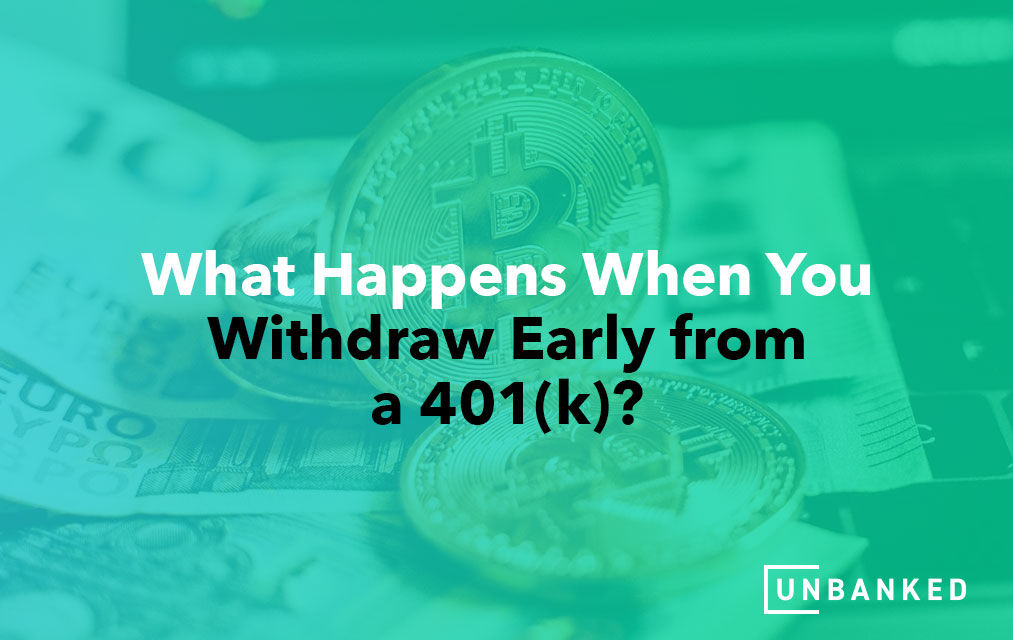The IRS earns about $5.7 billion in early withdrawal from retirement funds each year. And with the overwhelming hardship of the COVID-19 pandemic, more and more Americans are leveraging their 401(k) funds to survive primarily due to the CARES Act that eliminated the tax penalty for 2020.
But is an early 401(k) withdrawal a smart thing to do, and what are the penalties that come with it? We’ll explain everything you need to know about early withdrawal from a 401(k) plan, how to avoid penalties, and some alternatives.
What is a 401(k) Retirement Plan?
A 401(k) is a qualified profit-sharing retirement plan where employees can choose to invest a percentage of their wages into a retirement savings account. Money invested into a 401(k) is excluded from the individual’s taxable income, and employers can also contribute to the account as an employee benefit.
Money placed in the 401(k) is invested in various securities like mutual funds to help grow the balance for when the individual retires. Money in a 401(k) can’t be withdrawn until the individual reaches retirement age. Funds that are withdrawn early incur a penalty from the IRS.
At What Age Can You Withdraw 401(k) Funds Without Penalty?
You can start withdrawing 401(k) funds without penalty at the age of 59 ½. Once you turn this age, you’ll be able to establish a withdrawal plan without additional taxes or penalties. You are not required to take out funds from your 401(k) once you reach 59, but you may want to consider how you’ll want to move forward.
Want sound financial advice and tips? Learn how Unbanked can help you save for future financial emergencies.
Related Link: How Are the Underbanked Handling Their Finances in The US?
What Reasons Can You Withdraw from 401(k) Without Penalty?
There are a few other circumstances that allow you to withdraw without penalty before the age of 59:
The Rule of 55
The Rule of 55 applies to individuals that are 55 or older who have been:
- Fired
- Laid Off
- Voluntarily Quit Their Job
If any of these situations apply to you, the IRS will allow you to withdraw from your 401(k) without being penalized. But the Rule of 55 only applies to the 401(k) plan from your current job—not from a plan from a previous employer.
If you have several 401(k) plans from different employers, you may want to consider consolidating your plans into your current plan or an IRA.

COVID-19 CARES Act of 2020
To help individuals and families cope with the effects of the COVID-19 pandemic, the US Congress passed a provision in the CARES Act of 2020 that removes the early withdrawal penalty from 401(k) plans. Under the act, qualified individuals can withdraw up to $100,000 from their 401(k) retirement savings plan without paying the 10% penalty.
Now, any money taken out of their 401(k) is still subject to income tax, but Congress extended the period for paying income taxes on 401(k) funds withdrawn. And you can also defer paying taxes on the withdrawal if you pay back the funds into your account within three years of the withdrawal.
The CARES Act also waived the automatic 20% federal tax withholding. While this may help people in the short term, it could bite you when it comes time to file income tax because if you do take out $100,000, you may need to pay more than $20,000 in tax liabilities.
How to Qualify for the COVID-19 Early 401(k) Withdrawals
To avoid the IRS penalty and claim the COVID-19 pandemic as a hardship, you’ll have to certify how you’ve been financially affected by the pandemic. Qualifying circumstances include:
- Being diagnosed with Coronavirus
- Having a spouse or dependent diagnosed with COVID-19
- Being laid off, furloughed, quarantined, or reduced hours resulting in adverse financial issues
- Caring for your children at home because you couldn’t get daycare
- Shutting down your business because of COVID-19
While you may qualify, you’ll want to weigh whether dipping into your retirement fund is the best thing to do. In most cases, you’ll want to avoid early withdrawal if you can help it.
Related Link: A Few Challenges of Being Unbanked During a Pandemic
Other Circumstances That Are Not Subject to Penalty for Early Withdrawal
Under the following additional circumstances, the IRS won’t penalize you for early withdrawal:
- 401(k)s with auto-enrollment features
- Timely corrective distributions of excess contributions, aggregate contributions, and excess deferrals
- Death
- Total or permanent disability
- Unreimbursed medical expenses that are greater than 10% Adjusted Gross Income
- An alternate payee that is under the Qualified Domestic Relations Order
- Series of equal payments
- Dividend pass through from an ESOP
- An IRS levy of the plan
- A qualified military reservist called to active duty
- In-plan Roth rollovers contributed to another retirement plan with 60 days
If you don’t meet any of these qualifying criteria, you will be subject to a penalty for early withdrawal from your 401(k) plan.
Looking for alternatives to early withdrawal? Find out how cryptocurrency may be a wise investment for the future.

How Much Are You Penalized for Early Withdrawal of a 401(k)?
Any early withdrawal funds from a 401(k) plan are charged:
- A 10% penalty tax by the IRS
- Your income tax rate on the amount withdrawn (The IRS will automatically withhold 20% for taxes)
The IRS sees any funds pulled from a 401(k) as taxable income. Any withdrawn funds will be added to your gross income and may affect your tax bracket. While the IRS withholds 20% when you initially withdraw 401(k) funds, you may still have to pay additional taxes if your gross income puts you into a tax bracket with a tax liability of higher than 20%.
Another penalty may occur based on if your 401(k) plan has a vesting schedule for an employer-match program. Depending on the vesting schedule of your 401(k) plan, you may also lose a portion of the account balance if your account balance isn’t fully vested when you make the withdrawal.
This generally occurs with an employer-match vesting schedule. It would help if you researched your plan’s schedule before making a withdrawal.
How Much Tax Do You Pay on a 401(k) Withdrawal?
You will automatically pay 20% to the IRS as a tax withholding. Think of this as a prepayment. Then when you go to file your income taxes, the IRS will take a 10% penalty and then any additional taxes based on your Adjusted Gross Income (AGI) from the tax withholding.
If your AGI that includes the early withdrawal is less than a 10% federal tax liability, then you may get some of that 20% back when you file your return.
Unfortunately, for most people, an early withdrawal from their 401(k) can significantly increase their AGI. A higher AGI may mean that you will end up paying more than 20% because you are now in a higher tax bracket with the addition of your early 401(k) withdrawal.
How Do You Reduce Your 401(k) Taxes?
If you need to take out an early withdrawal from your 401(k), then there are several things you can do to minimize your taxes:
- Assess if you can qualify for an exception to the 10% IRS penalty.
- Determine if you qualify for the Saver’s Credit.
- Roll over your 401(k) account into another 401(k)or IRA within 60 days.
- Borrow from your 401(k) instead of taking an early withdrawal.
- Sell underperforming securities as a loss to offset the withdrawal income.
- Talk to a tax professional who can find other qualified ways to minimize your 401(k) taxes.
Want the latest insights on investing in blockchain technologies? Check out Unbanked’s latest headlines on the future of cryptocurrency investments.
Related Link: Can You Save Money While Being Underbanked?
Can You Cash Out of Your 401(k) and Take the Money?
Yes, if you quit or are fired from your job, you can withdraw the money from your 401(k). But unless you roll that money into another retirement fund, you will be charged the 10% penalty and will have to pay any additional income taxes on the withdrawal when you file your tax return.
Cashing out early is not a good plan. You should try to avoid early withdrawal or cashing out your 401(k) as much as possible. This should be a last resort for serious emergencies and hardships.
How to Borrow Money from Your 401(k) Fund
Borrowing money from your 401(k) fund can help you avoid the 401(k) penalty. And it may be a better alternative than making an early withdrawal. Not all 401(k) plans offer loan options, so you’ll need to see if your 401(k) plan allows it.
The most you can borrow from your account is $50,000 as long as the vested amount is over $100,000. If your account has less than $100,000, you can only borrow half of the total amount.
401(k) loans typically require that you pay back the loan within five years of the withdrawal. And you can pay off the loan sooner if possible. The loan will also require that you pay interest, which is generally one to two percent higher than the prime interest rate.
Drawbacks From Borrowing
While a 401(k) loan is a better alternative to an early withdrawal, there are a couple of drawbacks to consider before initiating the loan:
- Most borrowers will use the money they would typically invest into their 401(k) to repay their loan. This means for up to five years, they would not be adding any additional funds to their 401(k) and forfeiting an employer-match program, which would significantly set back their retirement savings. But in a lot of ways, this is no different than a withdrawal.
- If you can’t pay back the loan within five years, you’ll be subject to penalties and income tax liabilities, which can be even worse because you’ve now been paying additional interest.
Depending on the size of the loan and the hardships you are facing, you’ll want to weigh which option is better for you in the long run. It might be a good idea to talk to your accountant or a financial advisor about the best options.
At What Age Are You Required to Withdraw from Your 401(k)?
The government does not allow you to keep money in your 401(k) forever. And the government requires that you begin taking distributions from your 401(k) funds by the age of 70 ½. The CARES Act of 2020 extended the age to 72 if you turned 70 ½ during 2020.
When you start withdrawing funds from your 401(k), the government also sets a Required Minimum Distribution (RMD) that you must withdraw and becomes your taxable income. The RMD is calculated by the year’s account balance divided by the distribution period determined by the IRS’s Uniform Lifetime Table.
Try to Avoid Early Withdrawal from Your 401(k) Plan
While it may be a short-term answer to an unpredictable hardship, pulling funds early from your 401(k) has long-term consequences. Reducing your retirement savings significantly affects your account’s earning potential and dividends, and it may take several years to recoup the losses.
Other alternatives may be to cut expenses, have an emergency savings fund, invest in cryptocurrencies, sell securities, or take out a home equity loan. Whatever you decide, make sure you weigh the risks and drawbacks of early 401(k) withdrawal before you pull your retirement funds.
Unbanked follows the latest news, trends, and shifts in the cryptocurrency and financial markets. Stay on top of how the economic environment is changing to capitalize on how to invest wisely and save for the future.
Want to learn how cryptocurrency can open more banking opportunities? Read the latest on cryptocurrencies banking strategies and trends.
Related Link: 5 Common Benefits that Blockchain Has on Financial Services





